F
FishingMagic
Guest
René Descartes
Did you know that the legendary philosopher, René Descartes, was a keen angler? I didn’t either.
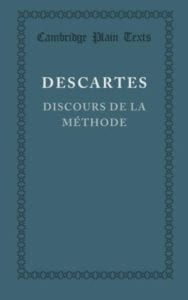
I was amazed; I didn’t know he was interested in fishing until I stumbled upon a picture of his famous book – “Discourse on the Method”, a whole treatise on hook lengths, feed preparation, casting and much more. Delving deeper I discovered that when he wrote this seminal work in 1637 it changed the worldview of philosophical thinking. His famous phrase ‘Cogito, ergo sum’ was translated to mean ‘I think therefore I am’ but this is a mistranslation from the French ‘Je pense, donc je suis’ which should have read Je peche, donc je suis, hence I fish, therefore I am. I began to look more closely at the influence of angling on other major scientific discoveries and cultural milestones throughout history and I came up with following amazing facts:
Sir Isaac Newton and Gottfried Leibniz …
…were good fishing buddies who would while away the hours when the fishing was slow by discussing the mathematical problems of the day. Between them they solved many contemporary questions such as the ‘Tangent Line problem’ – important when sharing swims (see image of fishing lines dangerously close)
Sir Isaac Newton got into a heated dispute with Gottfried Leibniz over the ‘Tangent Line Controversy’ whose solving led to the development of every schoolboy’s pet-hate: the dreaded Calculus! They were both fishing the same swim and their lines frequently touched as they trotted their floats down the stream. Leibniz was in the habit of allowing a lot of slack line which constantly converged at various points. They’d been discussing fluxions and fluents all afternoon but when then solution stared them in the face they both rushed off to try and get published first.
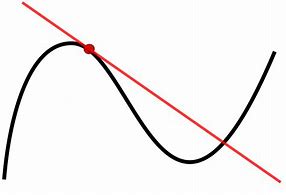
Unfortunately, for theirs was such a productive scientific relationship, they fell out over who should get the credit for the discovery and Newton accused Leibniz of plagiarizing his work. Though still fishing together, their relationship deteriorated to the point where, one day, Leibniz resorted to lobbing balls of ground-bait at him. This led to the important discovery of Gravity, stimulating Newton’s further investigations into ballistics! They eventually went their separate ways, Newton inventing the fig roll and Leibniz starting a chocolate biscuit factory.

Ludwig van Beethoven
In between commissions, and suffering from the musical equivalent of writer’s block, Beethoven was struggling to find a new opening for his Fifth symphony. In search of inspiration he went spinning for zander on the River Wien, Vienna. He wasn’t having much luck so he asked his gillie what he was doing wrong. The humble aid studied the master composer’s casting and action for a while before he offered this bit of advice:
“I think I can see where you’re going wrong. Your retrieve is too smooth, it doesn’t look natural. You need to jerk it a little; try reeling into this rhythm…Da-Da-Da-Dah – Da-Da-Da-Dah”
Beethoven’s eyes glazed over. “Vot voz zatt?”
“Da-Da-Da-Dah – Da-Da-Da-Dah” repeated the gillie.
“Gott in Himmel!” Beethoven exclaimed, dropped his rod, and dashed off as fast as he could to start his new symphony!
James Watt
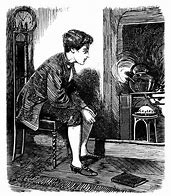
There is a popular story that James Watt was inspired to invent the steam engine (actually to improve on Thomas Newcomen’s earlier steam engine) by watching a kettle boil, the steam forcing the lid to rise and thus showing Watt the power of steam. But what most people don’t realize is that James Watt was boiling up two or three pints of hemp for a few days’ fishing he had planned. He was sat on a stool by the fire, tying hooks, when he saw the saucepan lid rising and falling. He quickly grasped the importance of his discovery but wasted a couple of months trying to invent a steam powered fishing barrow before harnessing his discovery with massive improvements to steam engines in mines and other commercial enterprises, thus kick-starting the industrial revolution.
Erwin Schrödinger
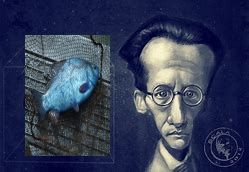
More recently the paradox of ‘Schrödinger’s Carp’ has tested supporters of ‘quantum super-position’ theory which states that whilst playing a carp, the fish can exist in two states. The Copenhagen interpretation implies that the carp remains both free and captive until the state is observed. Thus, the angler can never be quite certain whether he is going to land it or not! How true is that? With his ‘thought experiment’, Schrödinger demonstrated the difficulties facing specimen-hunters like his self when trying to target a particular carp: the importance of a great cast to achieve a ‘super-position’; the use of quantum-sized particles for loose-feeding and the ever present problem of ‘Entanglement’. He never quite answered the big question about what to do when the carp turns out to be a bream.
Charles Darwin
The garden of Charles Darin’s family home ran down to the River Severn in Shrewsbury where he gained a huge love of nature.
“I had a strong taste for angling and would sit for any number of hours on the bank of a river or pond watching the float”

As a keen angler, Charles Darwin was the first person to recognise what earthworms were capable of. He studied earthworms for a further 40 years. He even stated that worm conservation is much more important than the conservation of other animals once we consider their provision of what we now call “ecosystem services”, which is crucial for human survival. From Darwin’s study of earthworms, ecologists now consider earthworms a ‘keystone species’ because of how much they influence the chemical, biological and physical properties of soil: another great contribution to the fund of human knowledge from an angler.
Albert Einstein
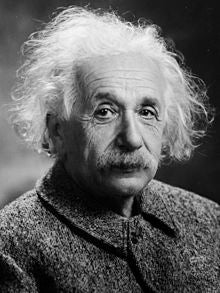
Whilst pike fishing one afternoon and not doing too well, Einstein sought advice from his gillie where the pike were, and he replied with a large sigh:
“For the last time, Albert – the Esox is where the mainstream and the current meet. I’ve told you before, there’s often a couple there. Look, I’ll make it easy; I’ll write it down for you so you’ll remember”. He continued laboriously, “E is for Esox, the two pike; M is for mainstream and C is the current, so it looks like this – E=mc2”
With that the great man became silent and stared mumbling “Ahhch, Zis is vot I’f been looking for!” and he went home and discovered the Theory of Relativity.
Interestingly one of these stories is absolutely true!
Andy Scholey
To comment on this article, go to: https://www.fishingmagic.com/forums...8068-andy-scholey-i-fish-therefore-i-ama.html
The post Andy Scholey: I fish, therefore, I am... first appeared on FishingMagic Magazine.
Continue reading...
Did you know that the legendary philosopher, René Descartes, was a keen angler? I didn’t either.

I was amazed; I didn’t know he was interested in fishing until I stumbled upon a picture of his famous book – “Discourse on the Method”, a whole treatise on hook lengths, feed preparation, casting and much more. Delving deeper I discovered that when he wrote this seminal work in 1637 it changed the worldview of philosophical thinking. His famous phrase ‘Cogito, ergo sum’ was translated to mean ‘I think therefore I am’ but this is a mistranslation from the French ‘Je pense, donc je suis’ which should have read Je peche, donc je suis, hence I fish, therefore I am. I began to look more closely at the influence of angling on other major scientific discoveries and cultural milestones throughout history and I came up with following amazing facts:
Sir Isaac Newton and Gottfried Leibniz …
…were good fishing buddies who would while away the hours when the fishing was slow by discussing the mathematical problems of the day. Between them they solved many contemporary questions such as the ‘Tangent Line problem’ – important when sharing swims (see image of fishing lines dangerously close)
Sir Isaac Newton got into a heated dispute with Gottfried Leibniz over the ‘Tangent Line Controversy’ whose solving led to the development of every schoolboy’s pet-hate: the dreaded Calculus! They were both fishing the same swim and their lines frequently touched as they trotted their floats down the stream. Leibniz was in the habit of allowing a lot of slack line which constantly converged at various points. They’d been discussing fluxions and fluents all afternoon but when then solution stared them in the face they both rushed off to try and get published first.

Unfortunately, for theirs was such a productive scientific relationship, they fell out over who should get the credit for the discovery and Newton accused Leibniz of plagiarizing his work. Though still fishing together, their relationship deteriorated to the point where, one day, Leibniz resorted to lobbing balls of ground-bait at him. This led to the important discovery of Gravity, stimulating Newton’s further investigations into ballistics! They eventually went their separate ways, Newton inventing the fig roll and Leibniz starting a chocolate biscuit factory.

Ludwig van Beethoven
In between commissions, and suffering from the musical equivalent of writer’s block, Beethoven was struggling to find a new opening for his Fifth symphony. In search of inspiration he went spinning for zander on the River Wien, Vienna. He wasn’t having much luck so he asked his gillie what he was doing wrong. The humble aid studied the master composer’s casting and action for a while before he offered this bit of advice:
“I think I can see where you’re going wrong. Your retrieve is too smooth, it doesn’t look natural. You need to jerk it a little; try reeling into this rhythm…Da-Da-Da-Dah – Da-Da-Da-Dah”
Beethoven’s eyes glazed over. “Vot voz zatt?”
“Da-Da-Da-Dah – Da-Da-Da-Dah” repeated the gillie.
“Gott in Himmel!” Beethoven exclaimed, dropped his rod, and dashed off as fast as he could to start his new symphony!
James Watt

There is a popular story that James Watt was inspired to invent the steam engine (actually to improve on Thomas Newcomen’s earlier steam engine) by watching a kettle boil, the steam forcing the lid to rise and thus showing Watt the power of steam. But what most people don’t realize is that James Watt was boiling up two or three pints of hemp for a few days’ fishing he had planned. He was sat on a stool by the fire, tying hooks, when he saw the saucepan lid rising and falling. He quickly grasped the importance of his discovery but wasted a couple of months trying to invent a steam powered fishing barrow before harnessing his discovery with massive improvements to steam engines in mines and other commercial enterprises, thus kick-starting the industrial revolution.
Erwin Schrödinger

More recently the paradox of ‘Schrödinger’s Carp’ has tested supporters of ‘quantum super-position’ theory which states that whilst playing a carp, the fish can exist in two states. The Copenhagen interpretation implies that the carp remains both free and captive until the state is observed. Thus, the angler can never be quite certain whether he is going to land it or not! How true is that? With his ‘thought experiment’, Schrödinger demonstrated the difficulties facing specimen-hunters like his self when trying to target a particular carp: the importance of a great cast to achieve a ‘super-position’; the use of quantum-sized particles for loose-feeding and the ever present problem of ‘Entanglement’. He never quite answered the big question about what to do when the carp turns out to be a bream.
Charles Darwin
The garden of Charles Darin’s family home ran down to the River Severn in Shrewsbury where he gained a huge love of nature.
“I had a strong taste for angling and would sit for any number of hours on the bank of a river or pond watching the float”

As a keen angler, Charles Darwin was the first person to recognise what earthworms were capable of. He studied earthworms for a further 40 years. He even stated that worm conservation is much more important than the conservation of other animals once we consider their provision of what we now call “ecosystem services”, which is crucial for human survival. From Darwin’s study of earthworms, ecologists now consider earthworms a ‘keystone species’ because of how much they influence the chemical, biological and physical properties of soil: another great contribution to the fund of human knowledge from an angler.
Albert Einstein

Whilst pike fishing one afternoon and not doing too well, Einstein sought advice from his gillie where the pike were, and he replied with a large sigh:
“For the last time, Albert – the Esox is where the mainstream and the current meet. I’ve told you before, there’s often a couple there. Look, I’ll make it easy; I’ll write it down for you so you’ll remember”. He continued laboriously, “E is for Esox, the two pike; M is for mainstream and C is the current, so it looks like this – E=mc2”
With that the great man became silent and stared mumbling “Ahhch, Zis is vot I’f been looking for!” and he went home and discovered the Theory of Relativity.
Interestingly one of these stories is absolutely true!
Andy Scholey
To comment on this article, go to: https://www.fishingmagic.com/forums...8068-andy-scholey-i-fish-therefore-i-ama.html
The post Andy Scholey: I fish, therefore, I am... first appeared on FishingMagic Magazine.
Continue reading...
